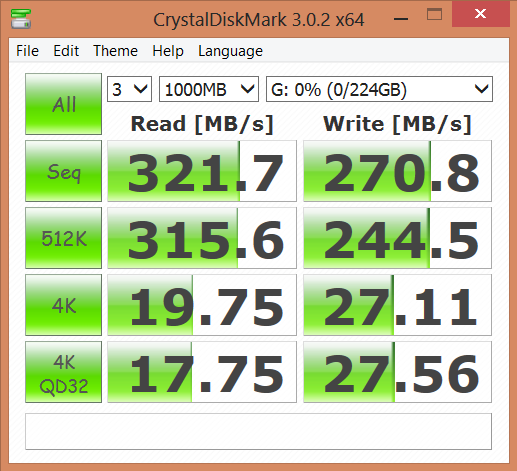INCOMPRESSIBLE DATA TESTING WITH USB 3.0
The OWC Envoy Pro is one of the strongest USB 3.0 performers we have had to date and it only seems fair to understand the performance while testing with incompressible data as well. We have excluded USB 2.0 testing as it’s performance won’t differ from what we have seen already.
Initial testing with random, or highly incompressible data, displays results similar to that of some early release SATA 3 SSDs, although the 4k random write results are a bit low.
Up until recently, AS SSD was the only benchmark created specifically for SSD testing and it uses incompressible data. AS SSD, for the most part, gives us the ‘worst case scenario’ in SSD transfer speeds because of its use of incompressible data and many enthusiasts like to AS SSD for their needs. Transfer speeds are displayed on the left with IOPS results on the right.

 Performance seen through our AS SSD testing is exceptional for a USB 3 SSD and the incompressible sequential write results don’t deviate much from what we might typically see in a standard SSD. The AS SSD Copy Benchmark, however, is significantly lower than many of today’s SSDs:
Performance seen through our AS SSD testing is exceptional for a USB 3 SSD and the incompressible sequential write results don’t deviate much from what we might typically see in a standard SSD. The AS SSD Copy Benchmark, however, is significantly lower than many of today’s SSDs:
ANVIL STORAGE UTILITIES PROFESSIONAL (BETA)
You may not see this for long (and its definitely not common) but you get a freebee simply for reading! Over the last little while, we have been assisting with beta testing new benchmark software called Anvil Storage Utilities which is an absolutely amazing SSD benchmarking utility. Not only does it have a preset SSD benchmark, but also, it has included such things as endurance testing and threaded I/O read, write and mixed tests, all of which are very simple to understand and utilize in our benchmark testing.
 The SSD Review The Worlds Dedicated SSD Education and Review Resource |
The SSD Review The Worlds Dedicated SSD Education and Review Resource | 

Very strange that USB 2.0 would make the 4K result so much slower compared to the 4K results on USB 3.0
Theoretically, 30 MB/s at 4K should be no problem with USB 2.0 either. How can we explain this behaviour ? Maybe the bridge chip used is at fault ?
I still think 4K at speeds of 30 MB/s through USB 2.0 should be possible provided the underlying SSD supports those speeds.
Excellent review !